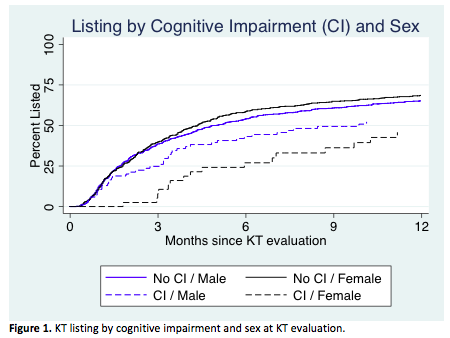Impact of Cognitive Impairment on Kidney Transplantation Listing Between Sexes.
C. Haugen,1 H. Ying,2 J. Garonzik Wang,1 M. McAdams-DeMarco,2 D. Segev.1,2
1Surgery, JHU, Baltimore
2Epidemiology, JHU, Baltimore
Meeting: 2017 American Transplant Congress
Abstract number: 243
Keywords: Kidney transplantation, Outcome, Risk factors
Session Information
Session Name: Concurrent Session: Kidney Clinical Psychosocial
Session Type: Concurrent Session
Date: Monday, May 1, 2017
Session Time: 2:30pm-4:00pm
 Presentation Time: 3:06pm-3:18pm
Presentation Time: 3:06pm-3:18pm
Location: E354b
Cognitive impairment (CI) is common in end-stage renal disease (ESRD) patients and is associated with greater mortality. Despite this, cognitive function is not routinely measured at kidney transplantation (KT) evaluation. Cognitive assessment at KT evaluation may identify a vulnerable population and inform listing practices. Given known gender and age disparities in access to KT, we investigated the association between CI and KT listing to determine to if CI contributes to these known disparities.
METHODS
We prospectively measured cognitive function at KT evaluation, using Modified Mini-Mental Status Exam (3MS), in 2,122 KT candidates. The patient's clinical teams were blinded to 3MS results. This validated tool assesses long-term memory, abstract thinking, delayed recall, and category fluency. CI was defined as a score <80 out of a possible 100 points. We used an adjusted Cox proportional hazards model to estimate the association of CI with listing stratified by sex and age.
RESULTS
Among KT candidates, 50.7% were African American, 60.2% were women, median age was 57.1 years and mean follow-up was 13.3 months. The overall prevalence of CI was 5.2% in women and 7.6% in men. Among candidates with no CI, 69.3% of women and 66.9% of men were listed for KT. Among candidates with CI, 3.6% of the women and 6.6% of the men were listed. CI was associated with not being listed among female candidates (HR=0.58, 95%CI: 0.37-0.92, p=0.021) but not male candidates (HR=0.90, 95%CI:0.67-1.21, p=0.5).  CONCLUSIONS
CONCLUSIONS
Women with CI are at a significant disadvantage compared to men with CI for placement on KT waitlist. This finding may contribute to the known gender disparities in KT listing and access to KT.
CITATION INFORMATION: Haugen C, Ying H, Garonzik Wang J, McAdams-DeMarco M, Segev D. Impact of Cognitive Impairment on Kidney Transplantation Listing Between Sexes. Am J Transplant. 2017;17 (suppl 3).
To cite this abstract in AMA style:
Haugen C, Ying H, Wang JGaronzik, McAdams-DeMarco M, Segev D. Impact of Cognitive Impairment on Kidney Transplantation Listing Between Sexes. [abstract]. Am J Transplant. 2017; 17 (suppl 3). https://atcmeetingabstracts.com/abstract/impact-of-cognitive-impairment-on-kidney-transplantation-listing-between-sexes/. Accessed February 27, 2026.« Back to 2017 American Transplant Congress
